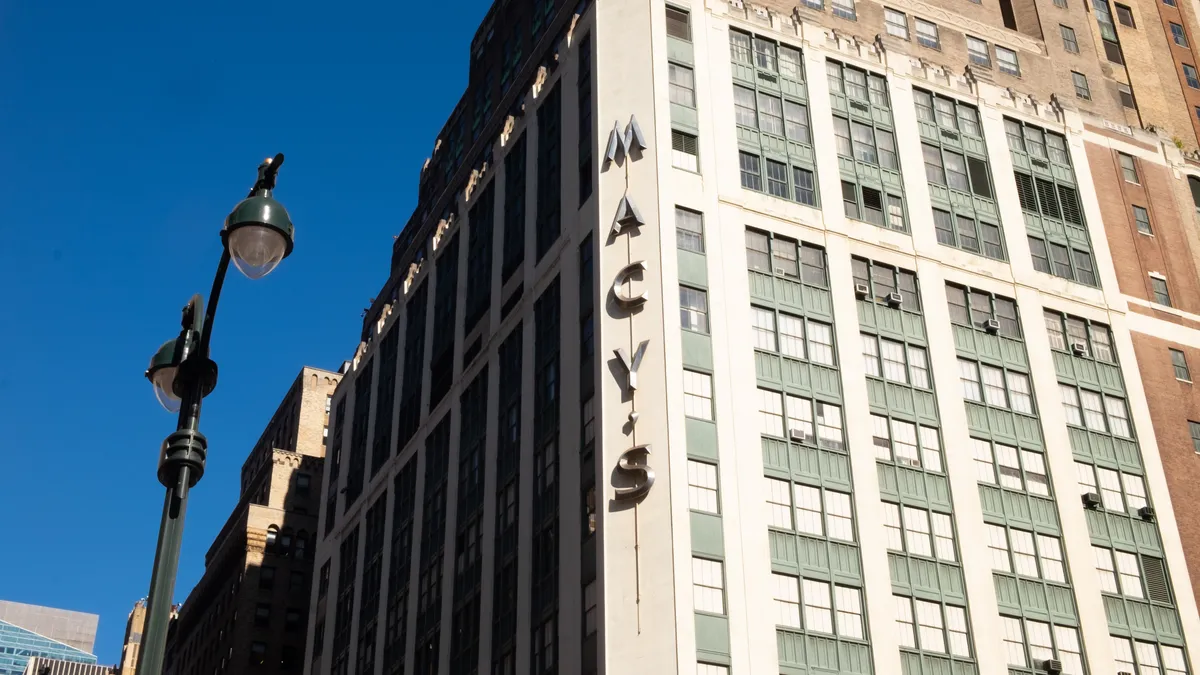Dive Brief:
-
Fitch Ratings on Tuesday said it has downgraded Macy's long-term issuer default ratings to 'BB' from 'BB+'. Fitch's outlook on the department store giant is negative, according to a press release emailed to Retail Dive.
-
Fitch also said that Macy's sales this year could decline nearly 30% to $17.6 billion and EBITDA could decline to about $200 million from $2.2 billion, "assuming store closures through mid-May and a slow recovery in customer traffic for the remainder of the year." While EBITDA "should significantly rebound" next year, that will be undermined somewhat "given Fitch's expectations of a likely downturn in discretionary spending that could extend well into late 2021," analysts said.
-
Assuming that U.S. discretionary retailers are closed through mid-May, Fitch expects their sales to be down 80%-90% despite some shift online, with slow improvement through the summer. "Given an increased likelihood of a consumer downturn, discretionary sales could decline in the mid-to-high single digits through the holiday season," per the release.
Dive Insight:
As the country's largest department store, Macy's has both advantages and disadvantages.
Advantages include decent liquidity. Fitch analysts noted that the company ended last year with $685 million of cash and is now replacing its $1.5 billion unsecured revolver with an expected $3 billion asset-based loan facility (including some $2.7 billion in its revolving credit facility and an up to $300 million bridge facility at a newly created financial vehicle, "Macy's Inventory Funding LLC," to which Fitch assigned an issuer default rating of 'BB.') Fitch assigned a 'BBB-'/'RR1' rating to Macy's that expected $3 billion secured ABL. Macy's has debt of about $530 million maturing in January and $450 million maturing in January 2022, which Fitch analysts said it could pay down with cash on hand or revolver borrowings.
Macy's new $1.1 billion term loan backed by real estate assets also provides liquidity, although that increases its leverage profile longer-term, they also said.
But the COVID-19 outbreak is likely to impede recovery, they warned. "The downgrade and Negative Outlook reflect the significant business interruption from the coronavirus pandemic and the implications of a downturn in discretionary spending that Fitch expects could extend well into 2021, as well as increased leverage from the new secured bond offering," Fitch analysts said.
And pressures from before the pandemic, including increased competition, many under-performing stores and an emphasis on clothing sales, are also complicating a recovery, they noted. Moreover, investments into e-commerce and omnichannel have hurt margins, they said. Few remedies for that have materialized as retailers and shoppers alike in recent weeks have realized the downsides of online shopping.
Still, Fitch took note of Macy's pre-pandemic plans to shutter 125 weaker stores over the next three years and shift some brick-and-mortar operations, including Backstage and a new "Market by Macy's" concept, to off-mall locations. The mid-tier department store is also set to benefit from the expected closure of many J.C. Penney stores, according to Fitch.
"Longer-term, Fitch views Macy's as well positioned to gain share in the mid-tier department store space as it continues to invest in its omni-channel and other growth initiatives," analysts wrote.
















